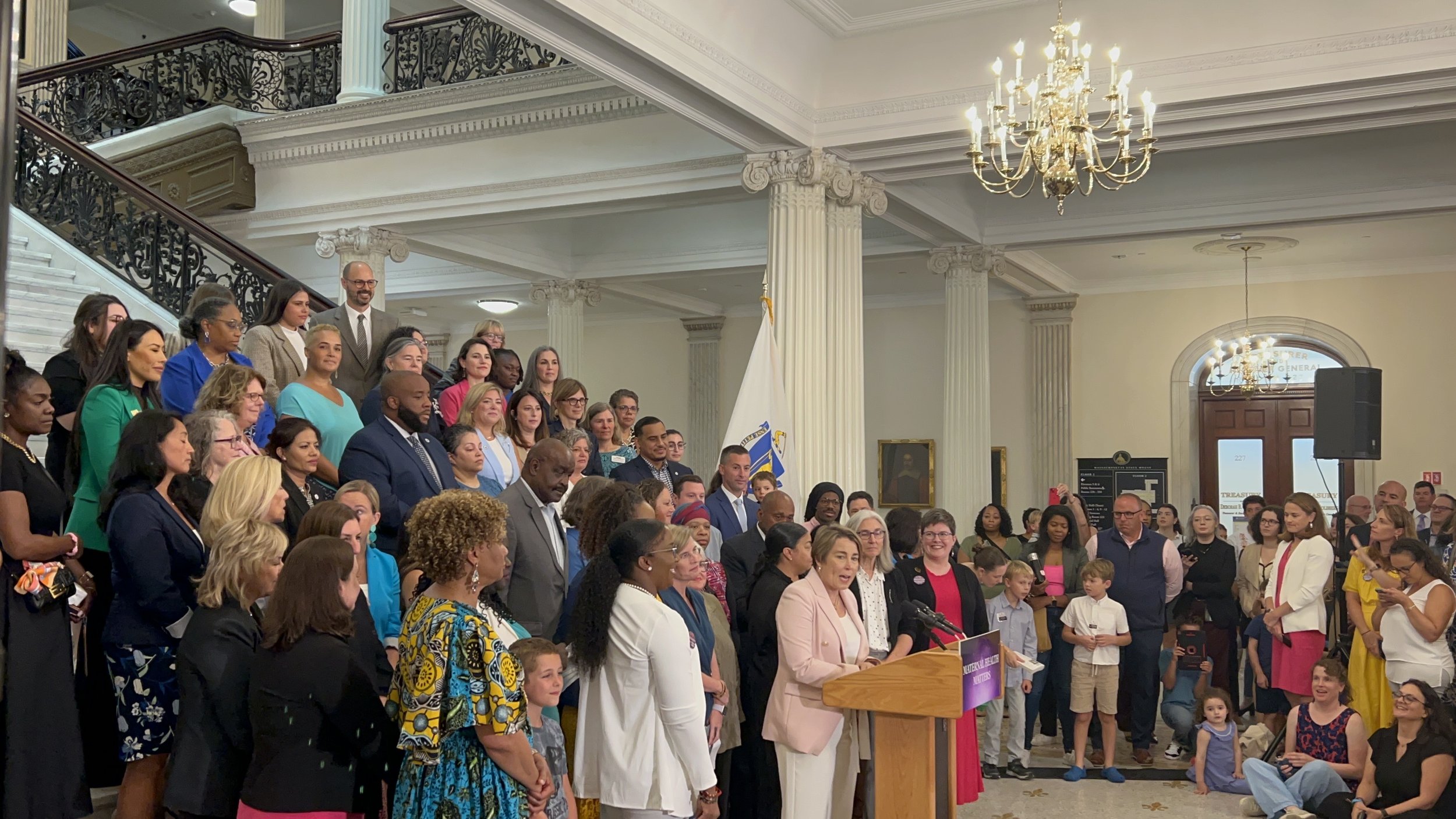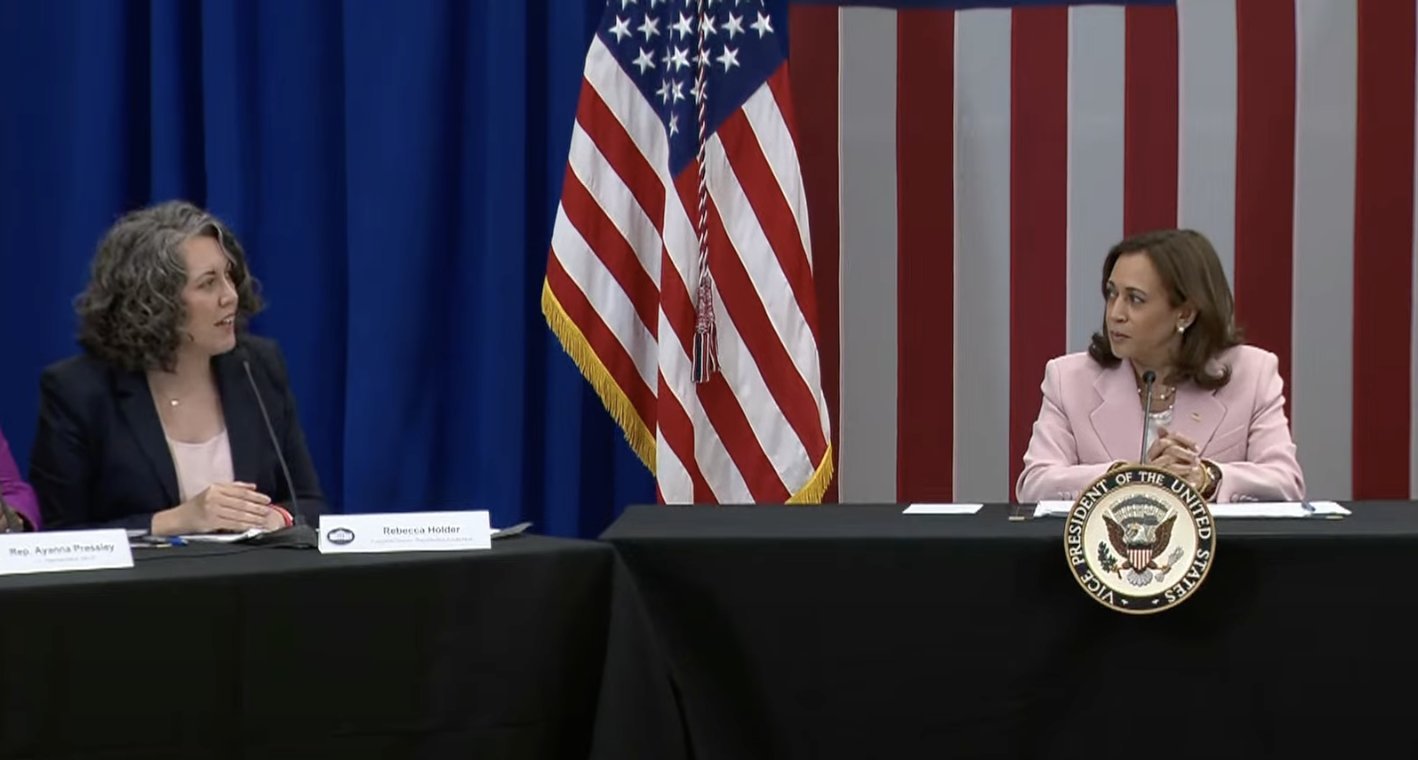
Recent Victories
Massachusetts 2023-24 Legislative Wins
Maternal Health Care
The Massachusetts legislature passed an historic maternal health care package that includes several priorities from our 2023-24 reproductive equity agenda. This package creates a pathway to licensure for Certified Professional Midwives as well as expands access to freestanding birth centers and doulas. The omnibus package also guarantees equitable Medicaid reimbursement for Certified Nurse Midwives, and contains measures to increase access to doulas, lactation support, and mental health screenings and services.
Early Child Care
In the FY2025 budget, the state made bold investments in Massachusetts’ child care infrastructure, including by making the state’s C3 operational grant program for providers permanent, expanding eligibility for child care subsidies, and significantly improving the pay and benefits for early educators. These investments will ensure that more Massachusetts families are able to access affordable, high-quality child care, help early educators create sustainable careers, and improve gender and racial equity in our state, all in pursuit of the Common Start vision.
Parentage Act
The legislature passed the Massachusetts Parentage Act, affording more dignity to LGBTQ+ parents in Massachusetts by ensuring they have access to the security of a legal parent-child relationship. This law will protect family formation in a post-Dobbs world, ensure that LGBTQ+ parents have the protections they need to start or build their families, and support children’s development and well-being over a lifetime.
Expanding Access to Reproductive Health Care
The legislature continued its annual $2 million investment in abortion access, infrastructure, and funds in the FY2025 budget. The budget also includes a standing order for over-the-counter contraceptives and prenatal vitamins, allowing patients on MassHealth to access these at no cost, without a prescription.
Expanding Paid Sick Days in Connecticut
The Connecticut legislature passed H.B. 5005, a bold bill to expand paid sick days to nearly all workers in the state. The legislation will require all employers, regardless of size or industry, to provide paid sick time to their employees; expand the definition of “family” in paid sick leave policy to ensure people can also care for their loved ones and chosen families; update paid sick leave accural policy; and extend access to Safe Days, so workers can take care of a family member who experiences family violence, intimate partner violence, or sexual assault.
Equitable Fertility Treatment in New Hampshire
The New Hampshire legislature passed a bill that requires health insurance plans to offer up to six rounds of Intrauterine Insemination (IUI) to all members, regardless of their family composition. This makes fertility treatment more affordable and accessible for LGBTQ+ couples and single people, and gives Granite Staters more control over if, when, and how they start or grow their families.
Passing An Act Expanding Protections for Reproductive and Gender-Affirming Care in Massachusetts
Following the fall of Roe v. Wade, the Massachusetts legislature acted swiftly and boldly to make Massachusetts values clear: Our Commonwealth would stand for reproductive freedom and expand access to reproductive health care in the face of national attacks on bodily autonomy. In July 2022, Massachusetts passed An Act Expanding Protections for Reproductive and Gender-Affirming Care, which took major steps to make abortion care more affordable and accessible, protect our reproductive and gender-affirming care providers, and ensure no one must leave the Commonwealth for care, at any point in their pregnancy. The law received national recognition, including a visit from Vice President Kamala Harris, who touted our work as a model for the rest of the nation. Specifically, the law:
Makes abortion care more affordable by mandating insurance coverage and eliminating cost-sharing for abortion and abortion-related care
Requires Massachusetts public colleges and universities to provide access to—or referrals for—medication abortion on campuses
Makes a statutory change to the 2020 ROE Act to expand access to abortion care later in pregnancy, taking steps to ensure no one must leave Massachusetts for care
Includes best-in-the-nation protections for providers and helpers who aid people seeing abortion and gender-affirming care from harmful, out-of-state litigation
Expands access to emergency contraception by establishing a statewide standing order for both over-the-counter and prescription emergency contraception
Expands an address confidentiality program for abortion providers and providers of gender affirming care to ensure they do not have to face threats of harassment or violence at home
The ROE Act
After the confirmation of Brett Kavanaugh to the Supreme Court, we knew Roe v. Wade was at risk. The only way to protect Bay Staters was to affirmatively protect access to abortion care. That’s why the ROE Act not only codified the right to abortion care into law, but also removed barriers to care in Massachusetts. After a two-year fight punctuated by a global pandemic and two vetoes from Governor Baker, the ROE Act went into effect on December 29, 2020.
Passing a law does not guarantee change happens promptly, so we immediately shifted our focus to implementation of the ROE Act. Below are some key milestones thus far:
The Board of Registration of Nursing issued an opinion that certified nurse midwives can offer abortion care within their scope of practice;
The courts issued a standing order to ensure that people under 15 are able to quickly access a judicial bypass for abortion care should they be unable to obtain the consent of a parent or guardian, including allowing for a telefonic bypass;
REN worked with hospital OB/GYN departments to ensure medical professionals understand and are able to implement the change related to providing abortion care later in pregnancy; and
REN advocated for patients who were denied care because of a lack of understanding about the new law.
ACCESS Law
After the 2016 Election, REN and the Coalition for Choice led advocacy efforts for the ACCESS Bill. The bill ensures that all state-regulated Massachusetts insurance carriers provide all FDA-approved contraceptive methods with no copay, including over-the-counter emergency contraception. On November 20, 2017, the ACCESS Bill was signed into law. Despite this legislative victory — a law more important than ever in the COVID-19 era — implementation of the law is failing. That’s why in early 2021, the Reproductive Equity Now Foundation (RENF) set out to research and understand the barriers to implementing the ACCESS law. The two biggest failures of implementation remain the inability to fill a 12-month prescription for oral contraceptives and the inability to use insurance benefits to obtain emergency contraception at the point of sale without paying out-of-pocket. We increased our pressure on the administration to hold insurers accountable for the failure to correctly implement the ACCESS bill. This includes several “listening sessions'' held by DOI and an upcomingFAQ on the ACCESS Law. We were thrilled to win an allocation of $500,000 in the Massachusetts FY2022 state budget for a public education campaign on the ACCESS bill. This is a significant win to help us educate a variety of stakeholders, including consumers, clinicians, and pharmacists, about the impact of the law.
An Act to Reduce Racial Inequities in Maternal Health
Racial inequities in maternal health care is a public health crisis across the country, and Massachusetts is not immune. Black women in Massachusetts are twice as likely to die from pregnancy-related complications as white women and also face significantly higher rates of maternal morbidity.
An Act to Reduce Racial Inequities in Maternal Health was signed into law on January 14, 2021. The commission established in this bill, designed to uplift the voices and leadership of Black and brown women, has begun investigating the root causes of these inequities and will issue recommendations to the legislature.
We look forward to fighting to make these recommendations law.
The Cap on Kids
At the beginning of the 2019-2020 legislative session, the House and Senate voted to end a harmful and outdated law, known as the Cap on Kids.
A relic of racist, sexist welfare reform policies of the 1990s, the Cap on Kids aimed to limit the size of families receiving state assistance by withholding additional funds if the family had another child while receiving assistance. The Governor repeatedly vetoed repeal of the Cap on Kids in spite of overwhelming support from the legislature for its repeal. Reproductive Equity Now was proud to stand with a broad coalition of non-profit organizations, unions, community organizations and legal groups that fought tirelessly to end this law.
On April 25th, 2019, the Senate voted to override the Governor’s veto, as the House had done on April 10, 2019. The repeal went into effect immediately.
Archaic Laws
During the 2017-2018 legislative session, Reproductive Equity Now worked with leadership in the House and Senate to repeal archaic statutes from the Massachusetts General Laws criminalizing women’s health care. The laws repealed included:
A ban on unmarried people accessing contraception;
A ban on distributing information about how to access contraception or abortion care;
A ban on distributing contraception;
A pre-Roe v. Wade criminal abortion ban;
A requirement that all abortions provided from the thirteenth week of pregnancy onward be performed in a hospital;
A ban on adultery; and
A ban on fornication.
Repeal of these archaic laws ensures that regardless of what happens at the federal level, Massachusetts will remain a beacon of reproductive freedom. The removal of archaic statutes was signed into law on July 27, 2018. The repeal went into effect immediately.
The Patch Act
In 2018, Reproductive Equity Now, in coalition with Health Care for All, celebrated passage of An Act to Protect Access to Confidential Healthcare (the PATCH Act). Before the PATCH Act was passed, a Massachusetts resident receiving health insurance as a dependent didn’t always receive fully confidential health care if an Explanation of Benefits (known as an EOB, which outlines recent health care procedures, including reproductive health care and other sensitive information) was sent to their primary plan subscriber. The PATCH Act remedied this loophole in Massachusetts law that compromised patient confidentiality.
The PATCH Act ensures that:
Patients can choose how to receive their EOB, and are sent them directly;
EOBs are not sent for preventative health services with no cost-sharing, such as testing for a sexually transmitted infection or a domestic violence counseling session; and
EOBs list only generic information, such as “office visit” or “medical service”, when sensitive care, including reproductive health care or substance abuse treatment, is provided.
On March 30, 2018, the PATCH Act was signed into law, and went into effect on April 1, 2019.
Paid Family and Medical Leave, Wage Increase
In 2018, Reproductive Equity Now worked as a coalition member of Raise Up in supporting Paid Family and Medical Leave for all Massachusetts employees. The law creates a paid family and medical leave insurance program and raises the minimum wage to $15 over five years. This bill allows all parents, including those who adopt, the time to care for their children and allows everyone to care for ailing family members without the fear of financial instability.
On June 28, 2018, Governor Charlie Baker signed this legislation into law. The paid family and medical leave benefits will be available starting in 2021, and the minimum wage will rise from the current rate of $11 to $15 by 2023.
Pregnant Workers Fairness Act
In the 2017-2018 legislative session, Reproductive Equity Now joined dozens of other leading advocacy groups in Massachusetts in advocating for the Pregnant Workers Fairness Act. This legislation ensures that pregnant workers are treated fairly on the job, are protected against workplace discrimination, and are given the reasonable workplace accommodations they need and deserve, like water and bathroom breaks. The bill received broad bipartisan support in the Massachusetts Legislature and saw unanimous favorable votes in the Massachusetts House of Representatives and the Massachusetts Senate. On July 27, 2017, the Pregnant Workers Fairness Act was signed into law.
Public Accommodations Law
In 2016, Reproductive Equity Now joined a coalitional effort led by Freedom Massachusetts to guarantee transgender Bay Staters full and equal protection under Massachusetts law. The bill, An Act Relative to Transgender Anti-Discrimination (S.735), provides critical anti-discrimination protections that ensure that everyone in the Commonwealth can access hospitals, hotels, restaurants, and other public places without facing discrimination on the basis of gender identity. On July 8, 2017, the Public Accommodations Bill was signed into law. It went into effect on October 1st, 2017.
Pay Equity Law
In 2016, Reproductive Equity Now worked with the Massachusetts Equal Pay Coalition to close the income gap for Massachusetts women. This law prohibits employers from asking about previous salaries in the hiring process and ensures that employees cannot be fired for discussing their salaries openly. The law also encourages employers to conduct internal reviews of their payroll to ensure equitable compensation. On August 1, 2016, the Pay Equity Bill was signed into law, and went into effect on July 1, 2018.
Anti-Shackling Law
In 2013, Reproductive Equity Now created a coalition with 48 other organizations to rally behind the Anti-Shackling Bill and urged legislators to ban the inhumane practice of shackling pregnant women who are incarcerated. The law requires correctional facilities to provide regular prenatal and postnatal medical care, including health monitoring and evaluation; a diet containing the nutrients necessary to maintain a healthy pregnancy, including prenatal vitamins and supplements; postpartum screening for depression; and written information regarding prenatal nutrition, maintaining a healthy pregnancy and childbirth. Correctional facilities must also provide pregnant and postpartum inmates with appropriate clothing, undergarments and sanitary materials. On May 15, 2014, the Anti-Shackling Bill was signed into law and went into effect immediately.
















